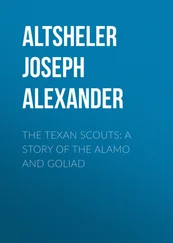Joseph Altsheler - The Sword of Antietam - A Story of the Nation's Crisis
Здесь есть возможность читать онлайн «Joseph Altsheler - The Sword of Antietam - A Story of the Nation's Crisis» — ознакомительный отрывок электронной книги совершенно бесплатно, а после прочтения отрывка купить полную версию. В некоторых случаях можно слушать аудио, скачать через торрент в формате fb2 и присутствует краткое содержание. Издательство: Иностранный паблик, Жанр: foreign_children, foreign_antique, foreign_prose, prose_military, на английском языке. Описание произведения, (предисловие) а так же отзывы посетителей доступны на портале библиотеки ЛибКат.
- Название:The Sword of Antietam: A Story of the Nation's Crisis
- Автор:
- Издательство:Иностранный паблик
- Жанр:
- Год:неизвестен
- ISBN:нет данных
- Рейтинг книги:4 / 5. Голосов: 1
-
Избранное:Добавить в избранное
- Отзывы:
-
Ваша оценка:
- 80
- 1
- 2
- 3
- 4
- 5
The Sword of Antietam: A Story of the Nation's Crisis: краткое содержание, описание и аннотация
Предлагаем к чтению аннотацию, описание, краткое содержание или предисловие (зависит от того, что написал сам автор книги «The Sword of Antietam: A Story of the Nation's Crisis»). Если вы не нашли необходимую информацию о книге — напишите в комментариях, мы постараемся отыскать её.
The Sword of Antietam: A Story of the Nation's Crisis — читать онлайн ознакомительный отрывок
Ниже представлен текст книги, разбитый по страницам. Система сохранения места последней прочитанной страницы, позволяет с удобством читать онлайн бесплатно книгу «The Sword of Antietam: A Story of the Nation's Crisis», без необходимости каждый раз заново искать на чём Вы остановились. Поставьте закладку, и сможете в любой момент перейти на страницу, на которой закончили чтение.
Интервал:
Закладка:
“Mebbe so, an’ mebbe not. I most gen’ally sleep when I’m sleepy. I’ve heard tell there was a big war goin’ on in these parts, but this is my land, an’ I’m goin’ to stay on it.”
“A good farmer, if not a good patriot. Good day.”
“Good day.”
They rode on and, in spite of themselves, laughed.
“I’m willing to wager that he knows a lot about Lee and Jackson,” said Warner, “but the days of the rack and the thumbscrew passed long ago, and there is no way to make him tell.”
“No,” said Dick, “but we ought to find out for ourselves.”
Nevertheless, they discovered nothing. They saw no trace of a Southern soldier, nor did they hear news of any, and toward nightfall they rode back toward the army, much disappointed. The sunset was of uncommon beauty. The hot day was growing cool. Pleasant shadows were creeping up in the east. In the west a round mountain shouldered its black bulk against the sky. Dick looked at it vaguely. He had heard it called Clark’s Mountain, and it was about seven miles away from the Union army which lay behind the Rapidan River.
Dick liked mountains, and the peak looked beautiful against the red and yellow bars of the western horizon.
“Have you ever been over there?” he said to Pennington and Warner.
“No; but a lot of our scouts have,” replied Pennington. “It’s just a mountain and nothing more. Funny how all those peaks and ridges crop up suddenly around here out of what seems meant to have been a level country.”
“I like it better because it isn’t level,” said Dick. “I’m afraid George and I wouldn’t care much for your prairie country which just rolls on forever, almost without trees and clear running streams.”
“You would care for it,” said Pennington stoutly. “You’d miss at first the clear rivers and creeks, but then the spell of it would take hold of you. The air you breathe isn’t like the air you breathe anywhere else.”
“We’ve got some air of our own in Vermont that we could brag about, if we wanted to,” said Warner, defiantly.
“It’s good, but not as good as ours. And then the vast distances, the great spaces take hold of you. And there’s the sky so high and so clear. When you come away from the great plains you feel cooped up anywhere else.”
Pennington spoke with enthusiasm, his nostrils dilating and his eyes flashing. Dick was impressed.
“When the war’s over I’m going out there to see your plains,” he said.
“Then you’re coming to see me!” exclaimed Pennington, with all the impulsive warmth of youth. “And George here is coming with you. I won’t show you any mountains like the one over there, but boys, west of the Platte River, when I was with my father and some other men I watched for three days a buffalo herd passing. The herd was going north and all the time it stretched so far from east to west that it sank under each horizon. There must have been millions of them. Don’t you think that was something worth seeing?”
“We’re surely coming,” said Dick, “and you be equally sure to have your buffalo herd ready for us when we come.”
“It’ll be there.”
“Meanwhile, here we are at the Rapidan,” said the practical Warner, “and beyond it is our army. Look at that long line of fires, boys. Aren’t they cheering? A fine big army like ours ought to beat off anything. We almost held our own with Jackson himself at Cedar Run, and he had two to one.”
“We will win! We’re bound to win!” said Dick, with sudden access of hope. “We’ll crush Lee and Jackson, and next summer you and I, George, will be out on the western plains with Frank, watching the buffalo millions go thundering by!”
They forded the Rapidan and rejoined their regiment with nothing to tell. But it was cheerful about the fires. Optimism reigned once more in the Army of Virginia. McClellan had sent word to Pope that he would have plenty of soldiers to face the attack that now seemed to be threatened by the South. Brigades from the Army of the Potomac would make the Army of Virginia invincible.
Dick having nothing particular to do, sat late with his comrades before one of the finest of the fires, and he read only cheerful omens in the flames. It was a beautiful night. The moon seemed large and near, and the sky was full of dancing stars. In the clear night Dick saw the black bulk of Clark’s Mountain off there against the horizon, but he could not see what was behind it.
CHAPTER III. BESIDE THE RIVER
Dick was on duty early in the morning when he saw a horseman coming at a gallop toward the Rapidan. The man was in civilian clothing, but his figure seemed familiar. The boy raised his glasses, and he saw at once that it was Shepard. He saw, too, that he was urging his horse to its utmost speed.
The boy’s heart suddenly began to throb, and there was a cold, prickling sensation at the roots of his hair. Shepard had made an extraordinary impression upon him and he did not believe that the man would be coming at such a pace unless he came with great news.
He saw Shepard stop, give the pass word to the pickets, then gallop on, ford the river and come straight toward the heart of the army. Dick ran forward and met him.
“What is it?” he cried.
“General Pope’s tent! Where it is! I can’t wait a minute.”
Dick pointed toward a big marquee, standing in an open space, and Shepard leaping from his horse and abandoning it entirely, ran toward the marquee. A word or two to the sentinels, and he disappeared inside.
Dick, devoured with curiosity and anxiety, went to Colonel Winchester with the story of what he had seen.
“I know of Shepard,” said the colonel. “He is the best and most daring spy in the whole service of the North. I think you’re right in inferring that he rides so fast for good cause.”
Shepard remained with the commander-in-chief a quarter of an hour. When he came forth from the tent he regained his horse and rode away without a word, going in the direction of Clark’s Mountain. But his news was quickly known, because it was of a kind that could not be concealed. Pennington came running with it to the regiment, his face flushed and his eyes big.
“Look! Look at the mountain!” he exclaimed.
“I see it,” said Warner. “I saw it there yesterday, too, in exactly the same place.”
“So did I, but there’s something behind it. Lee and Jackson are there with sixty or eighty thousand men! The whole Southern army is only six or seven miles away.”
Even Warner’s face changed.
“How do you know this?” he asked.
“A spy has seen their army. They say he is a man whose reports are never false. At any rate orders have already been issued for us to retreat and I hear that we’re going back until we reach the Rappahannock, behind which we will camp.”
Dick knew very well now that it was Shepard who brought the news, and Pennington’s report about the retreat was also soon verified. The whole army was soon in motion and a feeling of depression replaced the optimism of the night before. The advance had been turned into a retreat. Were they to go back and forth in this manner forever? But Colonel Winchester spoke hopefully to his young aides and said that the retreat was right.
“We’re drawing out of a trap,” he said, “and time is always on our side. The South to win has to hit hard and fast, and in this case the Army of the Potomac and the Army of Virginia may join before Lee and Jackson can come up.”
The lads tried to reconcile themselves, but nevertheless they did not like retreat. Dick with his powerful glasses often looked back toward the dark bulk of Clark’s Mountain. He saw nothing there, nor anything in the low country between, save the rear ranks of the Union army marching on.
Читать дальшеИнтервал:
Закладка:
Похожие книги на «The Sword of Antietam: A Story of the Nation's Crisis»
Представляем Вашему вниманию похожие книги на «The Sword of Antietam: A Story of the Nation's Crisis» списком для выбора. Мы отобрали схожую по названию и смыслу литературу в надежде предоставить читателям больше вариантов отыскать новые, интересные, ещё непрочитанные произведения.
Обсуждение, отзывы о книге «The Sword of Antietam: A Story of the Nation's Crisis» и просто собственные мнения читателей. Оставьте ваши комментарии, напишите, что Вы думаете о произведении, его смысле или главных героях. Укажите что конкретно понравилось, а что нет, и почему Вы так считаете.












